(Reuters) – The fee levied from taxpayers to fund the BBC will be frozen for six years in an effort to restrain spending by the state broadcaster at a time when other parts of the public sector face swingeing cuts.

Government sources confirmed on Tuesday reports aired by the BBC that the licence fee would be frozen at 145.50 pounds a year for every household with a television set.
The measure will be announced on Wednesday as part of a broad public spending review which will see some departments lose a quarter of their budgets as the government strives to slash its budget deficit from a record 11 percent of GDP.
The sources also confirmed that the BBC World Service, which until now had been funded separately from the rest of the corporation out of the foreign ministry’s budget, would now be funded from the licence fee.
The World Service broadcasts around the planet to an audience of millions in English and 31 other languages. It is one of the best known arms of the BBC around the world, particularly in developing countries.
Taking on the cost of the World Service and other BBC units that were previously funded separately, such as Welsh language TV station S4C, will mean the BBC will have to absorb additional costs of about 300 million pounds per year, the sources said.
The BBC reported on its website that the measures amounted to a 16 percent cut in its funding over the next six years.
The squeeze on BBC funding could prove popular after a series of revelations about the high pay of some BBC executives and presenters. Opinion polls show that a vast majority of Britons like the BBC in general, but many disapprove of some of the top pay packages.
(Reporting by Estelle Shirbon; editing by Michael Roddy)
Reuters
BBC sacks £475,000-a-year deputy director general Mark Byford

The BBC’s deputy director general, Mark Byford, is to be made redundant as part of a move to reduce its 10-strong executive board, members of which have long been accused of earning excessive salaries.
Mark Thompson, director general, will announce today that Mr Byford, a BBC employee for 32 years and occasional interim director general, will lose his job and will not be replaced.
As well as being paid his salary of £475,000 a year until he leaves in 2011, Mr Byford is expected to receive a redundancy payment of between £800,000 and £900,000.
The 52-year-old has a £3.7m pension pot, from which he can expect £215,000 a year when he reaches retirement age.
In August, Mr Thompson brought forward by a year a pledge to cut senior managerial costs by 25 per cent.
Sharon Baylay, head of marketing and communications, and Lucy Adams, human resources director, will also leave the board. They will retain their roles but report to Caroline Thomson, chief operating officer.
Yorkshire-born Mr Byford is popular among BBC staff. In 2004, he served as interim director general, after Greg Dyke resigned in the wake of the Hutton report, which claimed the BBC had misreported the official justification for the invasion of Iraq.
He has also managed the BBC’s responses to several scandals, including the “Crowngate” affair of 2007, in which a trailer for a documentary was edited in such a way as to suggest that the Queen had stormed out of a photography session. She was in fact on her way in.
In an announcement to staff today, Mr Thompson is expected to praise Mr Byford, saying that he had “never had a closer or more supportive relationship with any colleague”. Within the corporation, speculation concerning Mr Byford’s departure has been rife for some time, where his name has become linked with the issues of pay, expenses and pensions.
The Independent
BBC paid director general Mark Thompson £788,000

BBC director general Mark Thompson was paid £788,000 last year, although like other executives he waived his right to an annual bonus.
Mr Thompson’s remuneration, which was made up of a £624,000 salary, £9,000 in expenses and a £155,000 pension contribution, was up just £18,000 on the previous year.
He was easily the highest paid BBC executive, earning more than 70% than his nearest rival in the 12 months to March 31.
Mr Thompson’s salary has gone up 11% since his first year in the job, 2004/05, when it was set at £560,000.
It is also 70% higher than the salary received by the previous director general, Greg Dyke, in his final full year, 2002-2003, when his basic pay was £368,000 – though he also took home a bonus of £88,000.
The BBC director general’s overall remuneration has more than doubled since 1997-1998, when John Birt received a total of £387,000, including bonus but not pension contributions.
John Smith, the chief executive of commercial division BBC Worldwide, was the next best paid corporation manager last year, collecting £460,000, up from the year before by £16,000.
Mr Smith’s pay included a salary of £354,000, an £80,000 bonus and £26,000 in expenses.
The BBC deputy director general, Mark Byford, earned £437,000, made up of £425,000 in salary and £12,000 in expenses.
Jana Bennett, the director of BBC Vision, was paid £433,000, with a £343,000 salary, £20,000 in expenses and £70,000 in pensions-related remuneration.
The head of radio, Jenny Abramsky, pocketed £329,000, including £316,000 in salary and £13,000 in expenses.
The finance director, Zarin Patel, was paid £386,000, while the chief operating officer, Caroline Thomson, collected £361,000.
The new media boss, Ashley Highfield, was paid £359,000, while the marketing chief, Tim Davie, took home £406,000.
The new human resources boss, Stephen Kelly, was given a £75,000 payment when he joined the corporation last October as compensation for loss of income from leaving his previous job, contributing to overall remuneration of £268,000.
Overall executive pay at the BBC increased by just £75,000 in the 12 months to March 31.
Executive pay rose from a combined £4,177,000 last year to £4,252,000 this year.
Figures 2007
The Guardian

Leave a Reply